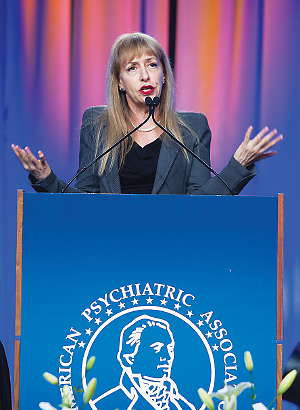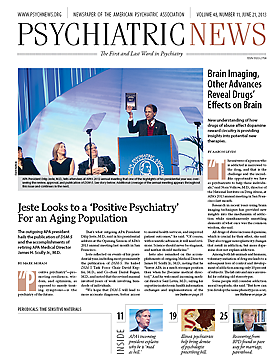Mind change”—a result of the threat to neuronal connections and growth of the brain posed by digital technology—may be as important a challenge in the 21st century as climate change.
That’s what Susan Greenfield, C.B.E., D.Phil., told APA members during the William C. Menninger Memorial Convocation Lecture at APA’s 2013 annual meeting in San Francisco last month. Greenfield, a neuroscientist at the University of Oxford and author of a neuroscientific theory of consciousness titled The Private Life of the Brain, described her work searching for biomarkers of—and pharmacologic interventions for—neurodegenerative diseases.
She outlined what she said is a neuroscientific theory of the mind. “The wonderful thing about being born a human being is that you are born with a full complement of neurons, but it is the growth of the connections between those neurons that accounts for the growth of the brain after birth,” Greenfield said. “You are going to be unique—no one will have a brain like yours in the 100,000 years we have stalked this planet because those connections are formed, updated, changed, and endlessly revised by the dialogue you as a human being have with the outside world. That is why we occupy more ecological niches than any other species on the planet, and it is why we are individuals, because if you have individual experiences—unlike, say the goldfish that doesn’t have a great personality—then you are going to be an individual.”
But Greenfield also expressed her belief that the vast amounts of time many people—especially children and adolescents—are spending in isolated contemplation of computer screens, tablets, or smartphones may be threatening the growth of connections by depleting the opportunities for real encounters with experience.
“If you are spending, as some kids are, five hours-plus a day not walking on the beach, not giving someone a hug, not looking someone in the eye,...you should expect to see some differences, and not all of them are going to be good,” she said.
Greenfield, who also is the author of You and Me: The Neuroscience of Identity, said there is a “huge amount of evidence accumulating” that mind change, analogous to climate change, is happening. “We need to take this seriously,” she said.
But unlike climate change—to which the human response can be only damage control—Greenfield said we can harness the power of neuroscience to make positive changes.
She recalled that President George H. W. Bush proclaimed the 1990s as the “Decade of the Brain.” But she said the accomplishments of that period and since have only scratched the surface of what is possible with the expanding reach of neuroscience. “That is nothing compared to this century, and I would like to persuade you that what we should really be thinking about is the 21st century—the whole century—as the century of the mind.
“For the first time in our privileged Western world, we have a longer life expectancy than at any other time,” she said. “So what are we going to do with all this time?.... That is the challenge, and that is what is so different about mind change. We have the enormous chance to truly make the 21st century the century of the individual human mind.” ■

